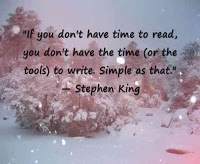
Success (or something like it)
January 8, 2013




There are a lot of theories out there discussing how to define and achieve success, but I would like to propose a simpler approach. How
we achieve success as writers is ultimately dependent on how we choose to
define success for ourselves. It seems innately human to seek “success” even if we don’t really know what that means to us. This tends to
result unhappiness, frustration, and various other depressing and
unproductive emotions. I am sure almost all of us are more than
familiar with some of these emotions and their negative effects on our writing.
Have you ever stopped to think that maybe it is because you feel stagnant and
not working towards something we all secretly (or not so secretly) desire:
Success?
we achieve success as writers is ultimately dependent on how we choose to
define success for ourselves. It seems innately human to seek “success” even if we don’t really know what that means to us. This tends to
result unhappiness, frustration, and various other depressing and
unproductive emotions. I am sure almost all of us are more than
familiar with some of these emotions and their negative effects on our writing.
Have you ever stopped to think that maybe it is because you feel stagnant and
not working towards something we all secretly (or not so secretly) desire:
Success?
So let’s stop for a moment and take
this opportunity to ask some important questions. How does each of
us define success for ourselves? What would make us feel fulfilled and happy
with ourselves as writers? Do we deem ourselves successful when we are making a
living by our writing? Do we have a certain number of books we want to sell to feel
successful? Are we constantly seeking that elusive perfect composition? Or do we
find success in every opportunity we have to write?
this opportunity to ask some important questions. How does each of
us define success for ourselves? What would make us feel fulfilled and happy
with ourselves as writers? Do we deem ourselves successful when we are making a
living by our writing? Do we have a certain number of books we want to sell to feel
successful? Are we constantly seeking that elusive perfect composition? Or do we
find success in every opportunity we have to write?
These
are some of the questions I want to focus on for the next month. We talked last
month about finding inspiration and the various ways we do this. But inspiration is
transient; it momentarily lights a fire under us or gives us a good idea.
However, a feeling of success or failure is more deeply rooted and chronic in
its effects on our writing. All of us define success differently, but we rarely
take the time to stop and think about how to get there when we are feeling
defeated or sad. Next time you’re feeling down, take a minute to reflect on how
successful you feel. Don’t get bogged
down by how successful you are.
are some of the questions I want to focus on for the next month. We talked last
month about finding inspiration and the various ways we do this. But inspiration is
transient; it momentarily lights a fire under us or gives us a good idea.
However, a feeling of success or failure is more deeply rooted and chronic in
its effects on our writing. All of us define success differently, but we rarely
take the time to stop and think about how to get there when we are feeling
defeated or sad. Next time you’re feeling down, take a minute to reflect on how
successful you feel. Don’t get bogged
down by how successful you are.
What’s
the difference? Well how successful you are is subjective — a combination of
how other people perceive your success matched against your own opinions. All that
really matters, however, is the latter: how do you feel you stack up to your own
opinions of success?

Previous
Publishing a Book and My Fears
You May Also Like

The Power of YOU: Be Excellent At Your Writing.
August 8, 2011
Seriously How Much Money Can You Make Publishing A Book?
May 9, 2012

